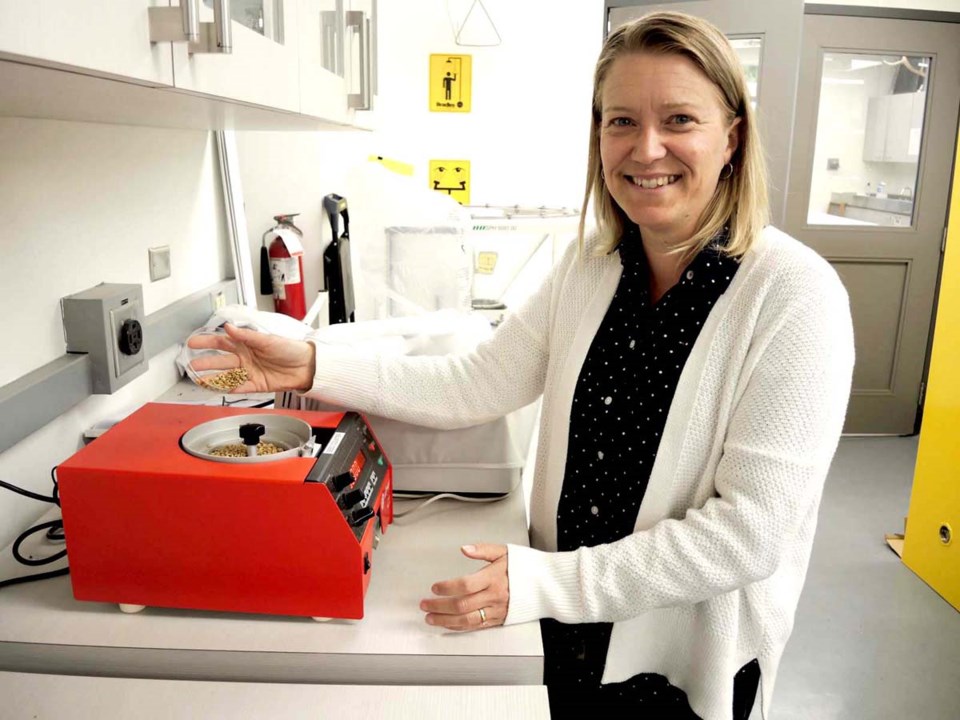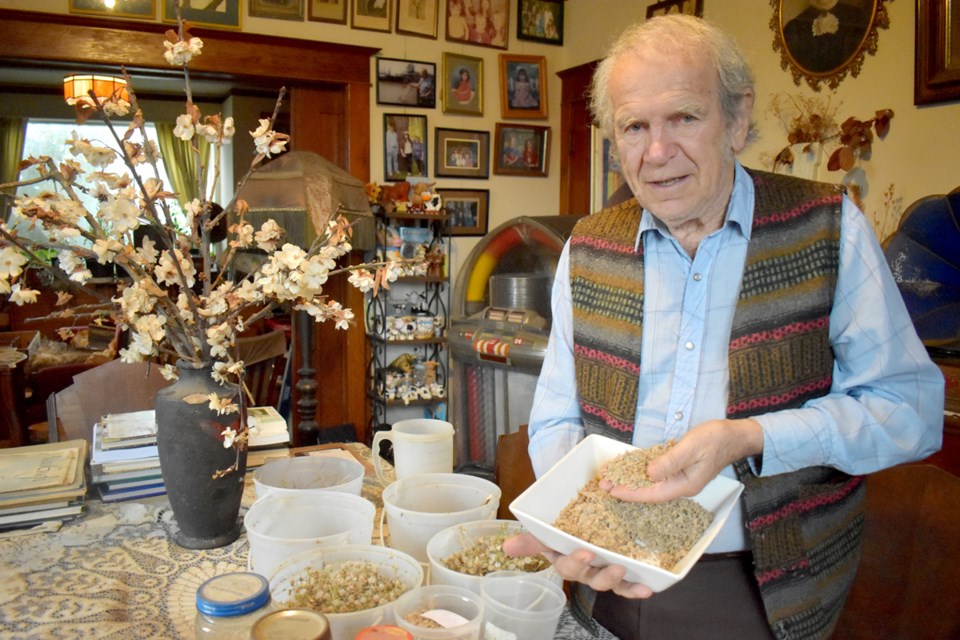In late October, a purple tomato plant was growing on Harold Steves’ front steps. His Alpha tomatoes had died in late September, but the Mikado tomato plant was still going strong.
Steves already grows and sells Alpha tomato seeds, which produce early tomatoes for a more northern climate — unlike many tomato plants sold in stores that are better acclimatized for a California climate. Now he’s curious about the suitability of the Mikado for Richmond and beyond.
It seems to be a hardy, blight-resistant, late-blooming tomato suited to B.C.’s cooler climate.
And it survived three nights of frost.
“That tells me that’s a variety that might be good for growing in northern climates,” Steves said.
The global seed company Monsanto recently created a purple hybrid tomato that is harvested late in the season, but Steves pointed out his Mikado is purple and grows just as late, so he doesn’t see the value in buying the Monsanto hybrid variety.
The problem with corporate agriculture, with companies like Monsanto is, that the seeds can’t be saved, allowing the corporations to maintain a seed monopoly.
“I don’t make any money when I sell (seeds) to a farmer, because he keeps his own seed,” Steves said.
In the late 1800s, the Steves family was already selling seeds in Richmond, selecting and cultivating seeds suitable to a northern climate. During the Depression, they sold their business to Buckerfields, but then bought the seeds back when Buckerfields was going out of business in order to ensure the seeds didn’t go extinct.
“I didn’t want to see us lose that genetic diversity,” Steves said.
Steves did a master’s degree in genetics in the 1960s, and he wrote his thesis on hybridization of plants — something he calls an “irony” considering his current seed cultivation.
“Now I am working on open-pollinated, non-hybrid varieties to maintain the genetic purity,” he said.
Steves said his family is no longer a major seed company, rather they are “preservation seed savers.”
The Steves have 60 to 70 varieties of seeds, but they only grow 20 to 30 per year to avoid cross-pollination.
Special conditions needed for growing seeds
Growing for seed production is very different from growing food because seeds need a longer growing period, isolation and the right weather conditions.
Some plants, like carrots, only produce seeds every second year. Others are “notoriously promiscuous,” like cucurbits — pumpkins, squashes and gourds — that love to spread their seeds around, explained Rebecca Harbut, an instructor at KPU’s Sustainable Agriculture & Food Systems.
Other plants, for example, beans, need a longer, drier period for growing to avoid fungal diseases that can hit them in cooler, wetter weather, she added.
With high land values in the Lower Mainland, farmers need high-value crops that can be grown on small parcels and Harbut believes seeds could be part of this equation.
She wants the Lower Mainland to hold onto its seed sovereignty, to maintain local genetics because the more variety one has in the local seed supply, the more diversity there is in the food system.
“If you don’t maintain those seeds, you’ll lose them,” she said.
The seed industry is dominated by a few major industrial agricultural companies and the seeds they develop are sold across North America — and around the globe.
Globally, the industrial agricultural model has certainly increased crop yields, but there have been other consequences.
The same seeds have been developed for a wide variety of climates for relatively “stress-free” farming, Harbut explained, in contrast to organic farming where the ecosystem is more complex with more weeds and more “pest pressure.”
In India, for example, the green revolution changed farming on a massive scale whereby western countries sold high-yielding hybrid seeds, increasing productivity — but decreasing the genetic diversity of food, degrading the quality of the soil and increasing the need for pesticides, fertilizers and large irrigation systems.
“It went from taking production systems that truly were not as productive, from just a pure yield perspective, but way more sustainable, to having this machine that moved forward and really simplified the system,” Harbut said.
And while it increased food production, local seed collectors, who had been gathering seeds for thousands of years, stopped growing and collecting those seeds.
“The genetics have vanished, they’re simply gone,” Harbut said. “The keepers of the seed stopped keeping the seed.”
Furthermore, large industrial agricultural systems are turning farming into “hydroponic” systems, Harbut said, where the soil has been mined of its nutrients is on “life support,” requiring constant chemical fertilization for seeds to grow.
This has happened in India with the green revolution, but it is also happening in Richmond, Harbut said.
This weekend, seed growers gathered at KPU with the aim of making locally grown seeds the “next trend” at the fourth bi-annual BC Seed Gathering, organized by FarmFolk CityFolk.

Lab created at KPU to support seed growers
KPU’s Sustainable Agriculture & Food Systems department in Richmond has been at the forefront of organic agricultural education in B.C. with its “farm school” and its incubator farm program.
Recently, it set up a lab to foster the local seed sector in order to maintain the region’s seed sovereignty. It includes growth chambers to test seed germination, a seed drier and machines that can sort seeds by weight.
KPU bought the equipment, worth $170,000, with a Canada Foundation for Innovation grant covering 40 per cent of the costs, which was then matched by the province. KPU and other organizations contributed 20 per cent.
The Greater Vancouver area is one of the most concentrated organic production areas, which includes a nascent seed sector in B.C., Harbut explained.
Most local farmers buy their organic seeds from the U.S. and from Ontario, but if there were a viable seed sector here, that money would stay in the local economy, she said.
It would also support sustainable agriculture with seeds bred and selected in B.C., suitable for growing in the local climate and geography.
“We are hoping to be a catalyst for the industry that is already there and just to support it — to get to the next level so we can become a region that is known for organic seed production,” Harbut said.



